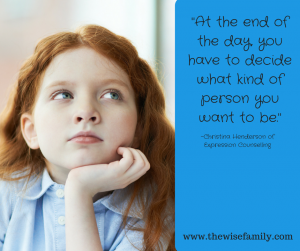
At this moment, I happen to have a lot of middle school girls in my practice. In my community, middle school is grade 6-8, so I’m referring to those tween years, not a girl anymore, not yet a woman. I also have a middle school-aged daughter, so the strife of these years is fresh on my radar. As I listen to these young women process their fears, struggles and conflicts, I am struck by how much smoother the ride would be if they were able to apply the principles of The Four Agreements to their interactions at school, home, extra-curricular activities, and with their peers. For the sake of keeping your attention (i.e. not posting the longest blog post ever), I’ll be posting one translated agreement a week over the coming month. This will give you a chance to share this stuff with the young ladies in your life, and support them in applying these principles.
So here it is: my interpretation of the (first of the) Four Agreements, written for middle-school girls.
Agreement 1: Be impeccable with your word
Translation: Don’t talk about people behind their backs. Why this is hard: Let’s face it, when someone hurts us, rejects us, annoys us etc., it feels good to find others to vent to who agree with us. Validation of these gross feelings is…well…validating. Often, you’re not the one leading the show either. Another girl is speaking poorly of others. In these moments you might find yourself joining in on the gossip because talking about others can make you feel more connected to your fellow crew.
Why this gets you into trouble: Girls are not good at keeping secrets. I’m sure this is fact. Inevitably one girl will tell the other girl what’s been said, and then the drama is on! Or, in an even worse case scenario, someone overhears you talking about them and you risk really hurting someone’s feelings. But even more, perhaps no one finds out. You have to live with that yucky feeling of knowing you might not have been kind to someone, and that never feels very good either.
What to do instead: We all need to work through our hurts, fears and rejection in some way. I usually encourage people to do that by finding someone they trust to talk to. This might be a parent, teacher, dance instructor, coach, school counselor, aunt, or one single best friend you can tell your story to. Hopefully this person encourages you to reflect on any part you may have played, as well as actually DO something about the situation. For example, to tell the person you are upset that they hurt your feelings. Although this can be very scary, most girls I work with are surprised to find when they talk openly and honestly with others, situations get resolved and friendships get stronger. And if the friend doesn’t respond well or is mean about it, she might not be the kind of friend you really want in your life.
For some tips on effective communication, I am a big believer in owning your own feelings and trying to be as non-blaming as possible. General guidelines say something like: State your feeling, state the behavior, and ask for what you would like differently. This might sound like: “I felt hurt when you did not invite me to the party. Next time I would really like to come.”
I also think approaching with curiosity helps reduce conflict. “I was surprised and hurt when I wasn’t invited to the party. Is something going on? Are you angry with me?”
At the end of the day, you have to decide what kind of person you want to be. And these are the years when you’re figuring all that out. This is no easy task (grown-ups, we need to remember this)! Personally, wouldn’t you like to be known as the girl who never speaks badly of others, and who always has nice things to say about people? It’s probably the best kind of reputation to have, and one that will make you feel really good about yourself.
Communicating our struggles takes practice and courage. So does staying out of the gossip. I applaud you on giving this your best shot.
Stay tuned for the second Agreement: Don’t take anything personally.
Until next time,
Christina
—
About Christina Henderson:
Christina is a skilled, compassionate and ethical therapist who grounds her practice in narrative and person-centred approaches. Christina can be contacted at Christina@expressioncounselling.ca.
For Christina’s full bio and for more information about her practice, please visit http://www.expressioncounselling.ca/about.
—
We hope you enjoyed part 1 of the The Four Agreements for Middle School Girls. We are so excited to have Christina as our guest contributor. Stay tuned for part 2 next week! 🙂
Be Wise!












I really enjoyed your Part 1 interpretation of The Four Agreements for middle school girls. I have 2 middle school granddaughters and would like to share all 4 parts with them. How do I get Parts 2, 3 and 4?